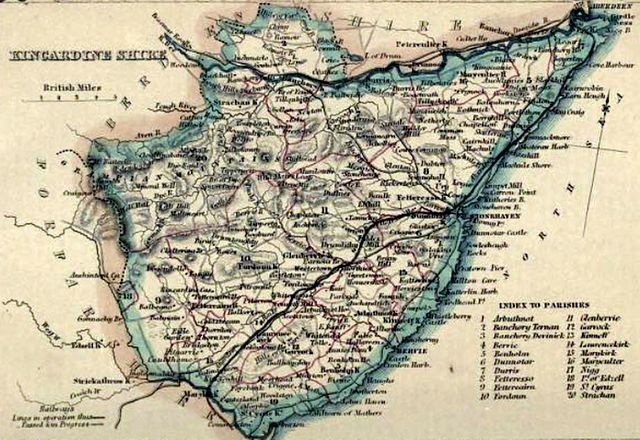Kincardineshire

"1854 KINCARDINESHIRE Civil Parish map" by The Imperial gazetteer of Scotland. VOL.II. Edited by Rev. John Marius Wilson.
Licensed under Public domain via Wikimedia Commons.
This website is in need of a new Coordinator - if you are interested, Nathan
History
The word shire is of Old English origin and meant office, charge, administration. The Norman Conquest introduced the word county through French from the Latin comitatus, which in mediaeval documents designates the shire. County is the district ruled by a count, the king's comes, the equivalent of the older English term earl. This system of local administration entered Scotland as part of the Anglo-Norman influence that strongly affected our country after the year 1100.
The number of counties has not always been the same, nor have the boundaries always been as they are now. Geographically Kincardineshire and Forfarshire are one; and in a very old account of the district it is stated that "Angus and Mearns were united and both called by the same name." The official who represented the King's authority was the Shire-reeve or Sheriff, but sheriffdoms were modified in number and area from time to time as was found convenient. Early in the fourteenth century there were at least twenty-five counties in Scotland, at the present time there are thirty-three.
The county was manifestly named from Kincardine in Fordoun parish, once a town with a royal residence. The name Kincardine is taken to mean "the end of the high land," i.e. where the Grampians terminate. Kincardine occurs frequently as a place name along the east of Scotland from Ross-shire to Fife; and, with the exception of Kincardine-on-Forth, it regularly designates a place at the end or the side of hills.
The county is often spoken of as "The Mearns," although this is not strictly accurate. The Mearns constitutes the district of the county south of the Grampians. The Howe of the Mearns is really a continuation of the great valley of Strathmore. Like "The Merse " and "The Lothians," we say "The Mearns," not "Mearns" alone. The etymology of Mearns is disputed. A tradition is that Kenneth II., in the ninth century, divided this region into two, bestowing them on his brothers AEneas and Mernas, whence they were called respectively Angus and Mearns.
SOURCE: Kinnear, George. Kincardineshire. Cambridge: University Press, 1921.
Queries and Surnames
Submit and View Queries and Surnames Submit a Query or Surnames for your lost Kincardineshire Scotland ancestor. Please use the linking feature only for genealogical material otherwise your query may be deleted.
{all_weblinks}65{/all_weblinks}
